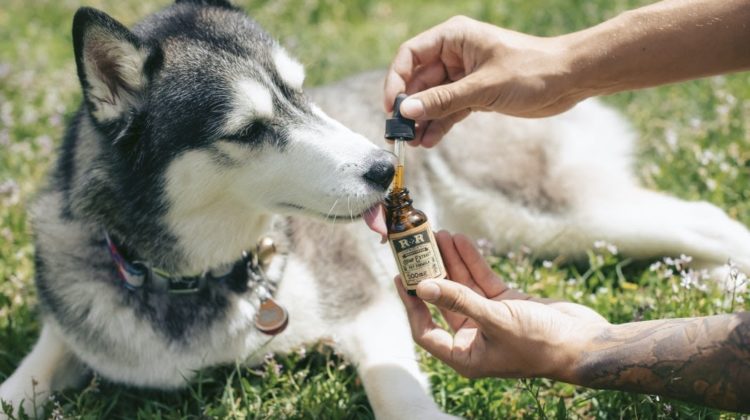
Husky enjoying hemp oil for pets. Photo credit: R+R Medicinals.
Cannabis — particularly hemp-derived products — is becoming more acceptable to use with pets for treatment of anxiety and joint pains. Vets recommend it and there are tons of companies that create oils and treats specifically for pets.
When it comes to these products, we often trust that the labeling on the bottle is accurate; it should state the correct dosage, and amount of cannabinoids like CBD in the product.
However, a study conducted by Leafreport finds otherwise. In fact, “out of 55 tested pet products, 31 products contained the wrong amount of CBD,” the study states.
There is no federal regulation regarding CBD products for pets. Consequently, companies may portray inaccurate information as factual. However, test results aka Certificate of Analysis (CoA) work to fill the gap in regulation. A third party lab typically conducts test results to determine exactly what’s in the products, from pesticides to cannabinoid content.
Mislabeling Mania
In order to determine whether or not companies properly label the cannabinoid content of their pet products, Leafreport researchers gathered 55 different products, and sent them to a Las Vegas lab for analysis.
The lab’s CoA or test results were then compared to the product’s labels.
“Next, we compared the amount of CBD shown on the CoAs to the advertised CBD content of each product. We also looked at what other cannabinoids were detected by the tests,” Leafreport says.
They then created a report with a table showcasing what each company claims their products contain; what the testing on the product indicates; variance between the label and CoA; and an alphabetical grade based on Leafreports’ findings.

Researchers indicated the variances with positive and negative symbols. For example, a negative symbol indicates that the product’s CoA showed it contains less cannabinoids than the company advertises. While a plus mark shows it contains more than advertised.
The variance of the product should range between plus or minus 10% of what the company advertised. This is true for cannabis and non-cannabis products, reports experts. If they fall within that range, they earn an “A.” If it’s within 20%, it gets a “B;” 30% a C; and 31% or more earns an “F.”

Overall, Leafreport found 24 products received an A; 12 got Bs; 4 got Cs; and 15 products earned Fs.
For example, King Kanine King Kalm Dog Paw Balm was one of the many ‘F’ ratings given by Leafreport. “King Kanine’s third-party tests showed 363.1 mg of CBD, whereas our independent tests found 612.3 mg — 68.6% more.”
However, products created by the pet company, Austin and Kat, earned As.
Combating Confusion
Julianna Carella, founder and CEO of Treatibles — which develops full-spectrum hemp products for pets — said that Leafreport’s findings are concerning, and further emphasize the need for transparency.
“There is undoubtedly an immense amount of hesitancy from consumers. The incorrect information that doesn’t pair with the ingredients is concerning,” says Carella in an email correspondence to Emerald.
“We want to keep our doors open with our transparency,” she says. “It’s in our company’s mantra for a reason.”
The vision that Carella has for Treatibles is to be completely honest by, “maintaining quality, consistency and transparency” for all Treatible products. This is why Treatibles has all products tested by a state-accredited, third-party lab — and makes those available on their website under Treatibles Lab Results for its consumers to see.
“All products feature our organic, full-spectrum hemp oil that is third-party lab tested to ensure consistent cannabinoid potency and to rule out heavy metals and bio-contaminants for our entire product suite,” the company explains on it
Is Federal Regulation Needed?
Like human food, the Food and Drug Administration (FDA) — in combination with individual state laws — is responsible for regulating pet food and drugs. But the FDA explains, there’s no requirement for premarket approval for these products. They write:
“Although pet food products do not need to have premarket approval by FDA, these products are subject to the requirements of the [Code of Federal Regulations] and pet food manufacturers are subject to individual annual product registration in most States.”
Such federal and state regulations require that pets foods must be labeled; labels cannot be misleading or inaccurate; and labels should include a guaranteed analysis of protein, fat, moisture and fiber content.
However, there isn’t a clear indicator on CBD content, which can result in inaccurate information towards consumers.
In a public health statement regarding CBD and cannabis in humans and in animals, “the FDA has not approved cannabis for any use in animals, and the agency cannot ensure the safety or effectiveness of these products.”
This is where state laws, and the need for CoAs come in.
In reference to CoAs, Leafreport agrees that, “these tests are important when shopping for CBD because some products have incorrect CBD levels or carry contaminants.”
In states like California and Colorado, cannabis and its derivatives must be lab tested for the above factors. Additionally, laboratories such as Green Leaf Lab and CW Analytical Laboratories are aiming to maintain transparency from manufacturer to consumer.
CoAs by third-party laboratories are an important way for pet owners to understand the components of these treats and tinctures. But as many companies gear their CBD products towards animals, is it time for the FDA to get involved to reduce the discrepancies found in Leafreports’ findings?


Leave a Reply